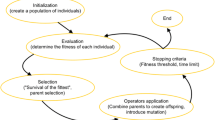Abstract
Understanding issues of trust and deception are key to designing robust, reliable multi-agent systems. This paper builds on previous work which examined the use of auctions as a model for exploring the concept of deception in such systems. We have previously described two forms of deceptive behaviour which can occur in a simulated repeated English auction. The first of these types of deception involves sniping or late bidding, which not only allows an agent to conceal its true valuation for an item, but also potentially allows it to win an item for which it may not possess the highest valuation. The second deceptive strategy involves the placing of false bids which are designed to reduce an opponent’s potential profit. In this work we examine the potential shortcomings of those two strategies and investigate whether or not their individual strengths can be combined to produce a successful hybrid deceptive strategy.
Similar content being viewed by others
References
Barbaro S, Bracht B (2006) Shilling, squeezing, sniping: explaining late bidding in online second-price auctions. Working paper, University of Mainz (this version: January 31, 2006)
Brandt F (2000) Antisocial bidding in repeated Vickrey auctions. Tech. Rep. FKI-241-00. Department of Computer Science, Technical University of Munich, ISSN 0941-6358
Brandt F, Weiss G (2001) Antisocial agents and vickrey auctions. In: Meyer JJC, Tambe M (eds) Intelligent agents VIII. Lecture notes in artificial intelligence (LNAI), vol 2333, revised papers from the 8th International Workshop on Agent Theories, Architectures and Languages (ATAL). Springer-Verlag, pp 335–347
Castelfranchi C (2001) The role of trust and deception in virtual societies. In: Proceedings of the 34th Hawaii international conference on system sciences
Castelfranchi C, Falcone R, de Rosis F (1998) Deceiving in golem: how to strategically pilfer help. In: Deception, fraud and trust in multiagent systems. Kluwer Publishing
Ó Broin P, O’Riordan C (2006) Deception in multi-agent auctions: An evolutionary approach. In: 17th Irish conference on artificial intelligence and cognitive science (AICS2006)
Ó Broin P, O’Riordan C (2007) Evolving a hybrid deceptive strategy for the repeated english auction. In: Proceedings of the 18th Irish conference on artificial intelligence and cognitive science (AICS2007)
Ramchurn SD, Huynh TD, Jennings NR (2004) Trust in multi-agent systems. Knowl Eng Rev 19(1): 1–25
Roth AE, Ockenfels A (2002) Last-minute bidding and the rules for ending second-price auctions: evidence from ebay and amazon auctions on the internet. Am Econ Rev 92: 1093–1103
Roth AE, Ockenfels A (2005) Late bidding in second price internet auctions: theory and evidence concerning different rules for ending an auction. Games Econ Behav 50
Wang W, Hidvegi Z, Whinston AB (2004) Shill-proof fee (spf) schedule: the sunscreen against seller self-collusion in online english auctions. Goizueta Paper Series, Emory University
Wellman MP, Wurman PR (1999) A trading agent competition for the research community. In: Proceedings of the international joint conference on artificial intelligence. Workshop on agent-mediated electronic trading. AAAI Press
Wilcox RT (2000) Experts and amateurs: the role of experience in internet auctions. Market Lett 11: 363–374
Author information
Authors and Affiliations
Corresponding author
Rights and permissions
About this article
Cite this article
Ó Broin, P., O’Riordan, C. An evolutionary approach to deception in multi-agent systems. Artif Intell Rev 27, 257–271 (2007). https://doi.org/10.1007/s10462-008-9080-7
Received:
Accepted:
Published:
Issue Date:
DOI: https://doi.org/10.1007/s10462-008-9080-7




